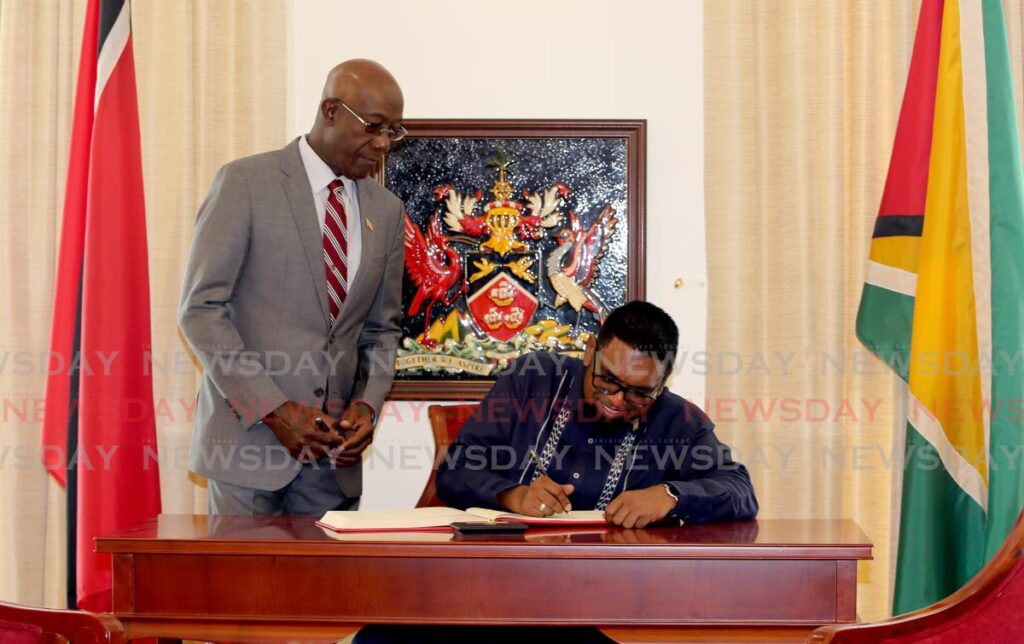Trinidad and Tobago, Guyana collaborate to make trade easier

Trinidad and Tobago’s Prime Minister and Guyana’s President Dr Mohamed Irfaan Ali have committed to working together to make trade easier among Caricom member states.
One of the ways they plan to do so is by reducing the many non-tariff barriers which stand in the way of production.
Dr Rowley and Ali said a task force has been developed to treat with the non-tariff barriers, and standardise and define policies for trade.
At a news conference at the Diplomatic Center in Port of Spain, after bi-lateral talks on trade, transport, energy and agriculture, Rowley explained that the non-tariff barriers – restrictions on trade outside of tariff systems – will undermine Caricom’s goals of creating an efficient single market and economy (SME) if not controlled.
He said in many cases policies to protect countries are used to limit or reject goods which could be traded.
“When I was agriculture minister, we wanted to sell pork to Jamaica," he said.
"TT had a good pork-producing infrastructure here. But we couldn’t because, while there was no tariff against the meat from TT, a Jamaican interest group – mainly technical people – used animal health to say, ‘You TT had swine fever 25 years ago, therefore we cannot buy any pork from you because you might introduce swine fever into Jamaica.’ As a result of that, the pork business in TT, which was heavily supported by the TT government and the private sector, shrunk.”
He used Chile’s cattle production as another example, saying there was a time when its beef was extremely cheap because it could not be traded out of fear that meat from Chile’s cattle production could spread hand, foot and mouth disease.
“Today the same meat that is selling for $2 a cup in Chile is now being sold at the same price of New Zealand meat, because hand foot and mouth disease has been overcome in a way that you can produce it and sell it safely.
“If those systems are available to us in Caricom, then South American meat should be available to Caricom nations. But someone in TT with a degree in something says if the meat is coming from South America, it has hand foot and mouth disease and it cannot come here.”
“Sometimes a customs officer by him or herself, using the customs law of the country, would say this or that cannot come in. And a lot of that is happening in Caricom,” Rowley said.
Ali added, policies are widely open to interpretation by public servants monitoring what enters through the ports, and this serves as a barrier to trade. The task force will deal with this issue, he said.
“You can ask ten public servants to interpret a statute and they might give you ten different interpretations. What we want to do in this task force is to have the interpretation done for them by the policymakers so no individual will try to interpret a statute outside of what is given,” Ali said.
“When you craft legislation and law you will see in front you will have each term and the definitions. We will have to, in this task force, define a lot of these things so that its subjectivity will be removed.”
Rowley added that in terms of average trade, decisions are made at individual ports, but the barriers which exist in each Caricom state differs.
“You would find that the non-tariff barrier in St Vincent is different to the one in Grenada or Trinidad, and that is what we are trying to get out of,” Rowley said.
“If we say that we have a single market and economy, that should mean something. A perfect working SME means that you have no impediment to goods, people or financing, going to any part of the market.”
Ali said work has already started for the task force, as many of the barriers have been identified and listed. He said both governments would keep the public informed on its progress.
Asked what would be the effect of the removal of these non-tariff barriers, Rowley said the effect would be “significant.”
The meeting and subsequent news conference was part of Ali’s three-day state visit to TT, where he was expected to tour industrial sites and participate in TT’s Agri-Investment Forum and Expo, being held from Friday to Sunday.
In May a memorandum of understanding was signed between Rowley and Ali to identify and eliminate non-tariff barriers between TT and Guyana.

Comments
"Trinidad and Tobago, Guyana collaborate to make trade easier"